 Menelik II Part II: The Post Adowa Era
Menelik II Part II: The Post Adowa Era


Quick Links: |
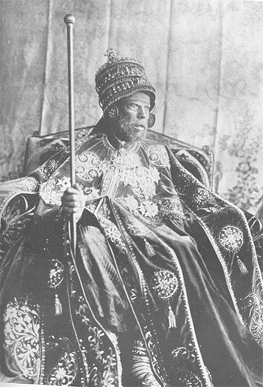 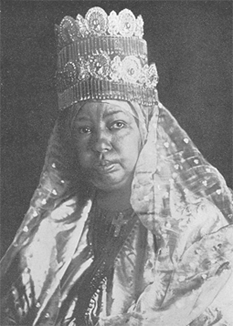 Emperor Menelik II and Empress Taitu in Coronation Regalia, late in life.The post Adowa era in Ethiopia was one of great change. Menelik II returned to his capital in a markedly stronger position than when he had left it. He returned the victorious military leader who had defended his country and his throne against a powerful technologically advanced foe. His empire was strongly united under his rule. The Great Powers of the world rushed to aknowledge Ethiopia as a legitimate independent state in Africa that they would have to deal with as a soveriegn entity. Soon permanent diplomatic missions were being established in Addis Ababa with resident ministers arriving to take up their new posts. The first to establish full permanent diplomatic representation in Addis Ababa was the French Republic. The Italians, British, Germans and Russians were not far behind. Soon Addis Ababa became a destination for European adventurers, fortune hunters, travelers and spies. Illustrous visitors began to drop in to meet Menelik, and explore this last remnant of independence in Africa. Among them, the Duke of Orleans, son of the ex-King of the French, Louis Phillipe. When the French Prince arrived to be recieved by the Emperor, he arrived wearing a saffari suit. Menelik II, took one look at the Duke d'Oleans and asked "Who is this man who does not know how to dress when appearing before a king?" The Duke was careful to be more appropriatly dressed when he returned later that day for dinner with the Imperial couple. Addis Ababa saw a huge explosion in technological advancement as the telephone, the telegraph, the automobile and the electric light bulb made their appearance for the first time in the country thanks largely to Emperor Menelik II. Inspite of resistance from the conservative clergy, these innovations were adopted and put to use rapidly. After much difficult negotiation and some false starts and stops, work was begun on the Addis Ababa - Djibouti railway that would become the major artery of trade in Ethiopia. The railway would not reach Addis Ababa until well after the Emperor's death however. After a brief flirtation with moving the capital from Addis Ababa to the new town of Addis Alem to the west, Menelik decided to stay put. To replenish the depleted forests of the area however, Menelik had imported the quick growing Euculyptus trees that are today a major feature of Addis Ababa.
 Abune Mattiwos, Coptic Archbishop of the Ethiopoian Orthodox Church During Reign of Menelik II Emperor Menelik II was a man with a facination with modern developments and advances. He hungered to learn about the latest scientific discoveries, technological developments and artistic achievements. He had a huge interest in modern medical care as well. He dreamed of bringing western advancemnts to Ethiopia, and bringing his people to a level of development that existed at that time in Europe. Ras Makonnen who had traveled widely in Europe supported the Emperor enthusiastically in this endevour. He was not always supported in this by his court. Most of the nobility was very conservative and looked upon these things with a suspicious eye. Foriegn influence was regarded with distaste and suspicion. Among the most conservative was Menelik's own wife. Although Taitu was amused by the knick-knacks and inventions that were brought before her, she was suspicious of the motives of the Europeans who brought them. When running water and electricity were installed in the palace and spread through Addis Ababa, she was not displeased. She marveled at the phonograph recording of Queen Victoria that was brought to them in which the queen sent her warm greetings. Menelik and Taitu both recorded phonograph messages to be taken back to the Queen in return and were quite impressed. Menelik jumped at the oportunity to ride in the first Motor Car to make it to Addis Ababa, much to the distress of his entourage, but the Empress chose to only look down from a window at the Palace and declined a ride. Her worry was that these new items would create new needs in the populace, and she wanted to know how the government could possibly meet these new needs and demands. In discussions with the Emperor's good friend and close advisor, Swiss born Alfred Ilg, the railway project was brought up and the Empress continued to voice strong opposition. She argued that it was unnecissary, that it would be too costly, that it would put many merchants out of work and that it could even bring an invader into the heart of the Empire. Ilg replied cleverly, "Your Majesty, this train that you so strongly oppose might one day take you to Jerusalem and the Holy Places". Suddenly subdued and taken aback the deeply religious Empress is said to have quietly stated "This I want more than all things." Regardless, Taitu remained a strong opponent of European intrussion into the Empire in the name of spreading progress. The Europeans liked to paint her as an opponent of progress, but it was their political motives that she was an opponent of. There were others that were even more extreme. The Emperor recieved the first telephone aparatus in Ethiopia and ordered that a line be set up between his rooms and the house of his treasurer. Amazed to be having a conversation with his treasurer while both were at their own homes, Menelik ran outside to make sure that someone wasn't hiding under his windosill and answering his questions. However, the next day, the treasurer recieved and electric shock from his telephone and his confessor along with other priests proclaimed the phone the work of Satan and distroyed it. They went to the Palace, were joined with more priests and burned the phone that they found there as well. The Emperor was livid when he heard what happened, but it was too late. A while later, when a movie projector was presented to the Emperor by a foriegn visitor, he eagerly anticipated watching his first moving picture. However he was wary that the priests would definately declare this the work of the devil and distroy his projector too. However, the presenter of the gift had anticipated this, and the first film shown in Ethiopia was a film about the miracle of Christ walking on water. The priests could hardly protest this, so they remained silent. However, all these technological advances caught on and spread largely due to Emperor Menelik and his strong desire for modernization.
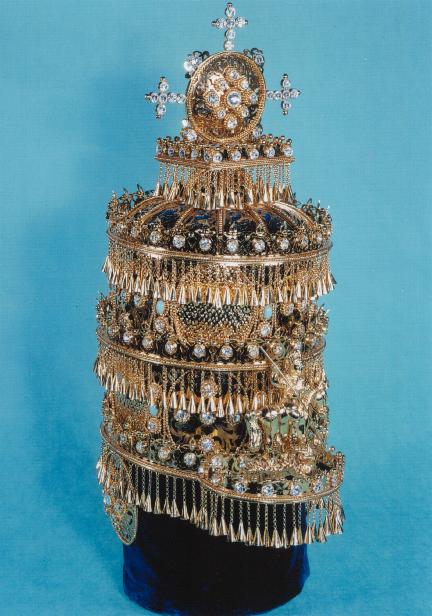 One of the Imperial Crowns of Emperor Menelik II Emperor Menelik II was a "King of Kings" in the literal sense of the word. King Tekle Haimanot of Gojjam had been crowned Nigus of Gojjam by Emperor Yohannis, and Menelik had confirmed him. However, Menelik would refuse to create anymore kings in the Empire under him, and the eventually caused his rift with Ras Mengesha Yohannis who expected to be crowned King of Zion. Empress Taitu tried to reason with Mengesha stating that his arranged marriage to her niece Kefey had been intended to cement his relationship as the "son" of the Emperor and Empress, and a family member. She argued that Tigrai had never been ruled by a king, but by a Dejazmatch traditonaly, and that only Shewa and Gojjam had been given this dignity (although Gojjam had only recieved this recently during the previous reign and Shewan royal house had granted the dignity to itself rather than through Imperial sanction initially). She argued that Her uncle Wube and his own father Emperor Yohannis, when they had been rulers of Tigrai had only had the title of Dejazmatch, and that he as a Ras had superseded both of them and elevated the province. Mengesha however was adamant that his father had been "King of Zion" and that in gratitude for his stepping back from his claims on the Imperial throne, the Emperor Menelik owed him the title of King. Menelik was equally adamant, and so when a petulant Ras Mengesha rebelled yet again, Menelik decided that enough was enough. When Mengesha was persuaded to yet again submit, Menelik refused to be merciful yet again to this man who had never gotten over losing the Imperial throne to him. This time he ordered Ras Mengesha arrested and placed under house arrest in the old Palace at Ankober in Shewa, where he remained for the rest of his life. The province of Tigrai would temporarily be administered by Ras Makonnen. Eventually Tigrai was divided three ways between Dejazmatch Gebre Selassie Baria Gabr, Dejazmatch Abraha Hagos, and a son of Ras Sebhat. Later still, the sons of Ras Araya Selassie Yohannis and Ras Mengesha Yohannis would be granted half of Tigrai each. Ras Mengesha was not the only would be royal vasal that caused Menelik problems. Even before he became Emperor, as the King of Shewa, Menelik had gone about bringing the southern kingdoms and principalities to heel, and re-incorporated them into the Ethiopian Empire. A bloody and difficult war had to be fought in 1894 to bring the Kawa of Wollaita, Tona, to accept Menelik II as his liege lord. Tona would be the last King of Wollaita, his successors were given the title of Dejazmatch, and regarded as nobility in Ethiopia from then on rather than royalty. Another princeling that resisted the Emperor was the Tato of Keffa, Gaki Sherocho. He refused to submit even after his military defeat in 1897. After 5 months as a fugitive, he captured and was brought in captivity to Addis Ababa, and placed under house arrest in the Imperial Palace. He was allowed his own house on the grounds, and his own staff of servants and slaves came with him, but he was made to always wear long chains to symbolize his status as a prisoner. However, in deference to his royal birth, his chains were made of gold. They would not be removed until Lij Eyasu assumed the throne in 1912. The Oromo monarchies of the south and west fared better however. Kumsa Moreda of Leqa Nekemt not only submitted, but converted to Christianity and accepted the Orthodox faith. Renamed and titled Dejazmatch Gebregziabiher Moreda, he continued to rule his fief and was allowed to resume every royal dignity he had enjoyed before. Jote Tullu of Leqa Qellam also submitted to Menelik and the Church, and was given the title of Dejazmatch as well. These Wollega Oromo dynasties would shortly become a favored source of wives for the Imperial family and the highest Shewan aristocracy, as they were considered of lofty birth and position. The young Muslim Sultan of Jimma, Abba Jiffar II, had initially resisted submission in 1884, but he too eventually submitted, convinced by his mother that fighting the powerful Menelik was futile. Menelik was grateful, and decreed that Abba Jiffar II was to remain the fully empowered Sultan of Jimma, and that the only concession that Menelik expected was payment of an annual tribute to the Crown. Abba Jiffar would become a loyal vassal to Menelik, and even went on to fight for him against less co-operative princelings in the south such as the Kawa of Wollaita and the Tato of Keffa. The most difficult to re-incorporate into the Empire was Arsi. Suffa Kusso and Damu Usu, two of Arsi's leaders were persuaded to submit to the then King Menelik of Shewa in 1882 in exchange for autonomy. However they were not able to convince any other Arsi notables, and what resulted was a bloody and difficult war that lasted between 1882 and 1886. Ras Darge and Menelik himself both led campaigns through Arsi to gain the submission of the province, but it was a difficult time, and in fact Menelik barely escaped with his life on one occasion in 1883. Finally, Ras Darge was able to deal a crushing blow to the Arsi rebels at the Battle of Azule in September of 1886. With the Egyptian withdrawal from Harrar in 1885, and the restoration of Emir Abdulahi, Menelik decided it was high time that the City State be re-incorporated into the Empire. The weak forces of the Emir of Harrar met the much better armed and much larger force of the Emperor at Chelenqo on January 6th, 1887, Ethiopian Christmas-eve. After a very brief shootout that lasted a few minutes, the Harraris fled. Following the entry of Menelik into Harrar, and the end of the Emirate of Emir Abdulahi, the Emperor appointed his cousin and confidant Ras Makonnen Wolde Michael (father of Emperor Haile Selassie) as the governor there. Keffa was given to the Emperors cousin, Ras Wolde Giorgis Aboye (son of his aunt Ayahilush). Ras Tessema Nadew, son of his beloved former tutor, was given Illubabur. The eastern end of Wellega (excluding Leqa Nekemt and Leqa Qellam) was granted to Dejazmatch Demiss Nessibu, who had fought valliantly at Adowa. Another favored General of the Adowa campaign, Fitawrari Hapte Giorgis, was given not only Borena in the far south but also Jebat and Mecha in western Shewa. Dejazmatch Balcha Saffo was given Sidamo. Hapte Giorgis was of mixed Gurage and Oromo ancestry, while Balcha was also an Oromo. Both had been captured as boys by Menelik's army's during the campaigns to re-incorporate the south into the Empire when Menelik was still King of Shewa. However, both had been raised by him, and then elevated to high positions of military and political responsibility. Both would become fiercly loyal to Menelik and his interests even after he had died. Hapte Giorgis would become one of the most powerful people in the Empire and a kingmaker in the government. In 1887 Ras Makonnen, along with Dejazmatch Jote and Dejazmatch Gebregziabiher of the Wellegan states led a campaign to subdue the sheikdoms of Asosa (Aqoldi),Khomosha and Bela Shangul which had for some years owed allegience to the Mahadist regime in Khartoum. After some initial fighting, Sheikh Khojale Al Hassan of Assosa submitted, but Sheikh Abdel Rahman Khojale of Bela Shangul fought on fiercely, and was finally defeated at Fadogno in 1897. Sheik Khojale Al Hassan then joined the Imperial forces, and launched an attack on Mohammad Wad Mahmud of Khomosha and defeated him, handing him over to Ras Makonnen. However, Sheik Khojale was soon found to be in secret correspondence with the British who were reestablished in the Sudan, and he was arrested and brought to Addis Ababa along with the two other captive Sheiks. After all three had formally submitted to the Emperor, they were allowed to return to their lands to continue ruling them as before in all respects, except that annual tribute must be sent to the crown. Muhammad Wad Mahmud was granted the title of Fitawrari, and Abdel Rahman Khojale was made a Dejazmatch. Sheik Khojale Al Hassan however insisted on keeping his traditional title of Sheik and accepted no other title. Ethiopia was begining to assume her present borders.
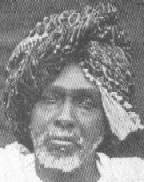 Sheik Khojale Al Hassan of Assosa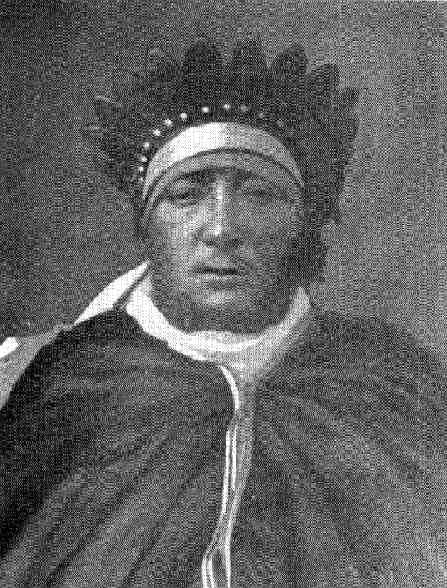 Kawa (King) Tona, last King of the Wolaita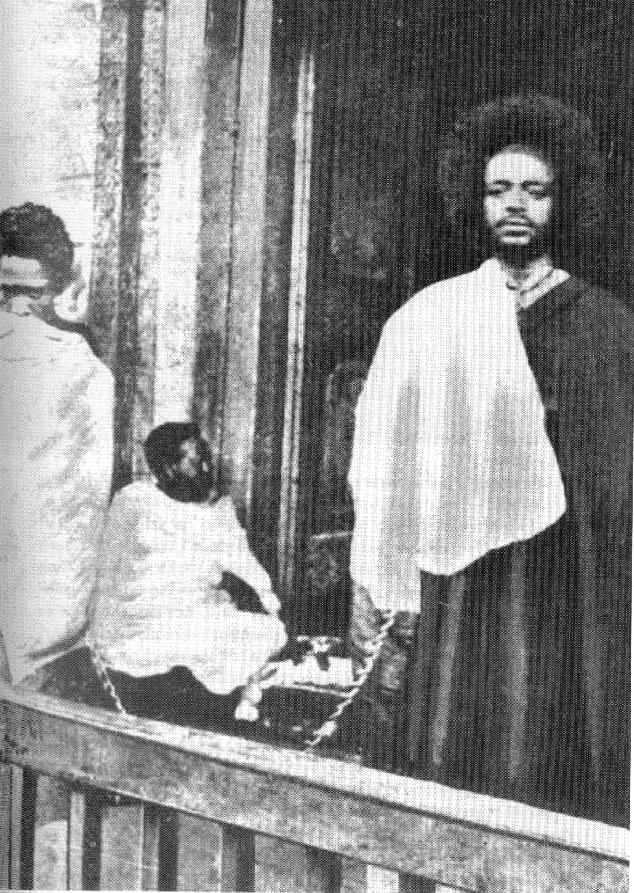 Gaki Sherocho, last Tato (King) of Keffa As the Emperor Menelik II had no aknowledged sons who lived to adulthood, the question as to who his heir would be was always open during much of
his reign. He was said to personally favor his cousin Ras Makonnen, son of his paternal aunt, Woizero Tenagnework Sahle Selassie. Ras Makonnen had been a loyal
and faithful subject, who had acted as the de-facto minister of foriegn affairs for many years. He had represented the Emperor at the coronation of King Edward VII in London,
and had traveled extensively in Europe, including Italy where he had tried to negotiate a solution to the crises over the Treaty of Wuchale, which later resulted in the Battle of Adowa.
He had also served at Adowa as a commander, shared most of the Emperor's progressive views, and was quite well respected and liked in court circles. His untimely death in March 1906 however, left
the succession up for grabs as the Emperor aged and became increasingly frail. Other candidates for the throne included Dejazmatch Taye Gulilat, direct decentdant of Menelik's
paternal uncle, Merid Azmatch Haile Michael Sahle Selassie. Another was Ras Wolde Giorgis Aboye, the son of Woizero Ayahilush Sahile Selassie, another aunt of the Emperor. Nevertheless, Lij Eyasu Michael was always a favorite candidate for the possition of heir apparent as Menelik's only grandson. Lij Eyasu was educated at the Imperial Palace in Addis Ababa, and also at the old Shewan capital, Ankober. He also traveled often to his father in Desse. He was taught at the modern Menelik II school with other young noblemen later on. From an early age, he was made aware of his proximity to the throne of Solomon. His step-grandmother, Empress Taitu seems to have had reservations about his position from the beginning. Even as a young boy, and increasingly as he grew older, the prince showed little regard for her, and the childless Empress did not relish the thought of being at his mercy one day. The roots of this may have been in the deep seated rivalry between the Mammadoch clan of his father, and the Empress's Werresheik clan of Yejju, both of whom claimed precidence in Wollo. Although relations between Ras Michael and Empress Taitu were always civil, her brother Ras Welle Bitul was an avowed enemy of Michael, and the two Rases often exasperated the Emperor with their constant feuding. Empress Taitu, in addition to her Yejju lineage, was also of Simien blood, and had Imperial ancestry in the Gondar line. As a thorough northerner, she was resented by the Shewan aristocrats as ambitious for her own family and their pretentions. Indeed, Taitu had managed to marry all her relatives into the major aristocratic houses of Shewa, Tigrai, and Gojjam. It was whispered, that the Empress would prefer Menelik's daughter Zewditu ascend the throne as Empress. As Zewditu was married to Taitu's nephew, Gugsa Welle, son of the aformentioned Ras Welle Bitul who was also of Imperial blood, it was said that she hoped that the couple would rule Ethiopia together, and return the capital to Gondar. Thus her Yejju-Gondar relatives would have unfettered influence at the expense of the Shewan aristocracy which surrounded Menelik and the non-Yejju Wollo nobles whose hopes were pinned to Eyasu. As it was, the Tigreans and the most of the Wollo shared the concerns of the Shewans as far as the ambitions of the Empress, and there was little likelyhood of her being able to carry out this plan. In October 1909, it was decided that Lij Eyasu should be betrothed to marry Romanework Mengesha, daughter of Ras Mengesha Yohannis, and grandaughter of Emperor Yohannis IV. She was also the daughter of Woizero Kefey Welle, and thus great-neice of Empress Taitu. It was a brilliant political match on several levels. This marriage was the second attempt at a union between the Houses of Tigrai and Shewa (the first being the marriage between Ras Araya Selassie Yohannis and Princess Zewditu which ended with the death of the Ras),and it had the added element of involving an alliance between Empress Taitu's family and that of Ras Michael. It was clearly a product of the Empress' policy of political marriage, and served her interests nicely. As the couple were still very young, the nuptuals were not consumated, pending their coming of age. Possibly, no one wanted to repeat the tragedy of Zenebework Michael. Zenebework Michael was Lij Eyasu's sister, and Menelik's granddaughter. At the age of twelve, she was married to the much older Bezabih Tekle Haimanot of Gojjam, son of King Tekle Haimanot. A year later, she was dead, probably because she was unable to carry out child birth at her young age.
 The death of Ras Makonnen at Kulibi in March 1906 eliminated the man in whom Menelik and many of his more progressive nobles had the most confidence, from the succession. Menelik was determined not to turn to Dejazmatch Taye Gulilat, who in fact after Menelik, was the next Shewan prince in the male line of succession. (Makonnen himself was in the female line). Taye Gulilat's grandfather, Merid Azmatch Haile Michael had claimed the Shewan crown for himself and rebled against his nephew Menelik many years before, and Menelik had never forgiven his uncle, and held his decendants in suspicion. His options had narrowed, and the situation was about to get more urgent. Not long after the death of his cousin Makonnen, Emperor Menelik collapsed while watching renovation work being done on the Church of St. Mary on Mt. Entoto where he had been crowned. Although he had recovered swiftly, and returned to the Palace, attempts to keep the incident quiet failed, and rumors of his ill health intensified. Menelik had actually suffered a stroke at Entoto. The visiting Italian governor Martini of Eritrea would state that signs of the stroke were apparent in the Emperor's eyes. Menelik suffered yet another stroke in August 1907, and although he endured the various celebrations of his 63rd birthday on August 19th, he looked unwell to all who saw him. On May 18, 1908, Emperor Menelik was again on Mt. Entoto, on his way north to Sellale with the Empress to attend the dedication of a church, when he suffered yet another stroke. This time, his right side was paralized temporarily, and he was greatly weakened. He could not return to Addis Ababa until the 10th of June. Immediately upon his return to the capital, Empress Taitu began to tightly regulate access to the Emperor and began to assume more and more executive power. The Emperor had become dependent on support to walk, and his speech was greatly affected. His physical decline was steady after that. Over the next year, all the nobles and the foriegn diplomats were informally notified that Lij Eyasu was the legitimate heir to the Emperor of Ethiopia. It had been generally assumed since the death of Ras Makonnen, but it took on a more formal existance now. Then in early May, 1909, the nobles were assembled before the Emperor, and Empress Taitu approached him and asked publicly who his successor should be. The weakened Emperor whispered in her ear and she turned to the assembly and said "He says Lij Eyasu". However, a few days later on May 15th, 1909, at Jan Meda (the Imperial parade ground), a proclamation of the Emperor was read to assembled throngs of nobles, diplomats and subjects. It read "My child (lij) will succeed me". There was no mention of Lij Eyasu's name, nor of any other person qualified to be called the Emperor's child. The proclamaition of the Archbishop anathamizing anyone who refused to accept the Emperor's choice of heir also did not mention the name of that heir. Some have said it may have been an attempt by elements of the Shewan aristocracy, most notably the governor of Ankober, Welde Tsadik, to put Taye Gulilat on the throne when Menelik died, or by Empress Taitu to place her nephew Ras Gugsa Welle on the throne, as he was married to Menelik's daughter Zewditu, and thus qualified to be called the Emperor's "child". It was at this point that Taitu arranged for her great-neice, Romanework Mengesha be betrothed to Lij Eyasu. Shortly after this betrothal, on October 30th, 1909, it was publicly and unabiguously proclaimed that the Heir to the Throne and Crown Prince of Ethiopia was indeed, Lij Eyasu Michael, grandson of Menelik II. The Emperor also had his chairman of the cabinet of ministers, Ras Tessema Nadew proclaimed Lij Eyasu's guardian and Lord Regent of the Empire, and that he would serve in this capacity if Menelik should die before Eyasu reached the age of majority. Menelik had chosen Ras Tessema for several reasons. Ras Tessema was the elderly head of the powerful aristocratic Adissge clan, and a man generaly respected by the nobility. He was a man who had long displayed little personal ambition and had served Menelik loyaly. His father, Ato Nadew, had been Menelik's much loved childhood tutor and advisor. This act however deeply hurt Menelik's surviving first cousin, Ras Wolde Giorgis Aboye, who as an elder member of the Imperial family had believed (along with many others) that he was the natural choice for the Regency. He retreated to his province of Keffa, clearly offended, and there were many who believed he was quite justified in his offence. Wolde Giorgis's marriage to Empress Taitu's cousin Yeshimebet may have undermined him with much of the Shewan nobility who were wary of increasing the Empresses influence. Menelik's health then deteriorated to the point where he became unresponsive, and Ras Tessema began to rule the Empire in trust for Lij Eyasu. However, Tessema was not the agressive autocratic type, whereas Empress Taitu very much was. She soon eclipsed him and continued to make decisions and issue edicts, make appointments and demotions at will. Soon her favorites, and her Yejju and Semien relatives were being appointed to all the posts of power and influence. This would displease the Shewans, the Tigreans, and the Wollo relatives of the heir. A showdown was inevitable. In particular, the Oromo and Gurage noble, Fitawrarri Hapte Giorgis Denagde, was unhappy with her appointments to high office. The old general of Menelik found all her appointments to be scandalously nepotistic, and approved only of the appointment of Dejazmatch Taffari Makonnen to Harrar in succession to his late brother Yilma, and his father Ras Makonnen.
 Taitu's conduct continued to irritate the Shewan nobility and angered the paternal relatives of the Heir to the Throne. When Ras Tessema and Fitawrari Hapte Giorgis urged the Empress to halt appointing only her relatives to office and causing alarm to the foreign diplomats in February of 1910, she angrily called Ras Tessema an imbecile and Fitawrari Hapte Giorgis an invalid. This was the last straw. The two men summoned several other notables to Hapte Giorgis'home and resolved to remove the Empress from state authority. The group included Dejazmatch Gebre Sellassie Baria-Gabr, ruler of Adowa and prominent Tigrean noble man, Dejazmatch Lul Seged (later Ras), Dejazmatch Demissew Nessibu, Dejazmatch Wesene Tirfe and Dejazmach Merid Hapte Mariam. The foriegn missions, particularly the French, British and Italian missions were active in encouraging this group against the Empress, as she was regarded as being anti-foriegner. Many secret communications took place encouraging the nobles to act. After ascertaining the support of the Army, these prominent nobles notified the Archbishop Abune Mattiwos of their intentions (the Archbishop was a long time foe of the Empress)and had sworn to him that they would not shed any blood. The Archbishop asked to go to the Empress to speak to her first and try to convince her to step aside peacefully and calmly. Taitu's informants however beat him to the chase. When he arrived at the Palace, the women of the Imperial household staff came running out and threw stones at the cleric, calling him a dog and a son of foreigners, telling him to go back to Egypt. The Empress sent out word that she didn't have time to see him. Archbishop angrily returned to his residence and sent the Empress a terse letter in which he stated that if she did not recieve him she would be turned over to soldiers. Taitu reluctantly agreed to recieve him, and after some tense discussion, agreed to recieve the conspirators in audience. The nobles arrived dressed in court dress, and made the proper bows to the Empress. Dejazmatch Gebre Selassie then stepped forward and politely asked Her Imperial Majesty to confine herself to the caring of the sovereign, her husband, and halt her involvement in the daily affairs of government which were the rightfull duties of the Regent of the Empire, Ras Tessema Nadew, in the name of the Heir, Lij Eyasu Michael. Although the Dejazmatch and the others had been meticulous in their etiquette, the Empress could not contain her rage. She berated Dejazmatch Gebre Selassie as a coarse and disgusting person, unrefined, and a mere shepherd. In a dig at her own Semien origins (Semien being known for it's sheep), the Dejazmatch elegantly replied "If not for Emperor Menelik, we might all be shepherds, but thanks to him we are all now shepherds of men." Exasperated, she then turned on Ras Tessema demanding to know what action she had ever taken without consulting him as regent, and asking him if it was not he who constantly involved her in state matters because of his insistance that she was far more experienced in these matters. His answer was considerably more feeble than the Dejazmatch's quick witty reply. He mumbled something about her constant interference in government, and appointment of her relatives to all offices. Ras Mengesha Atikem of Agew Midir, a man who had recently been recently agrieved by the Empress and was probably there to complain about being dispossesed of his province by her, and happened to be present at the scene. Although deeply agreived at the Empress, the Ras was never the less offended at this affront to the wife of his master, and he and Dejazmatch Nessibu came to fisticuffs. The two were bodily seperated and were calmed down by the Archbishop. The Empress then sat on her throne and haughtily looked away from the assembled nobles and in a sign of displeasure, refused to talk with them further. She had a spokesman read a statement from her that asked for permission to leave the capital and take the Emperor to Gondar, or if they insisted he remain in Shewa, either to the monastery of Debre Libanos, or her personal fief of Bulga. She would care for him there with her servants and go into seclusion as she was clearly not wanted in the capital. The nobles were startled. They had not expected such a reaction and were not pleased with the prospect of the public seeing them as ingrates who would drive the stricken Emperor and his wife from their home. They pleaded with her not to leave, and to remain in the city and care for the Emperor in the Palace where he and she rightly belonged as the reigning monarchs of the Empire. Her spokesman replied that Her Majesty would think about it. In the context of the significant political defeat she had just suffered, it was a small victory, but she must have savored it. She would ofcourse agree to stay. The woman who had ruled Ethiopia along with her husband, and probably the most powerful Empress-consort of Ethiopia ever, was thus deposed. The foriegn missions congradulated the nobles privately for the way they had carried out Taitu's deposing. Ras Tessema was now the de facto as well as the de jure ruler of Ethiopia, and all business would now be conducted in the name of the Heir to the Throne, Lij Eyasu, rather than in the name of Menelik, King of Kings. Empress Taitu retreated to the Imperial chambers and continued to nurse her stricken husband with the help of her step-daughter Zewditu and a host of servants. All officials were discouraged by the government from meeting the Empress for any reason. Even social visitors were discouraged. The staff was decreased little by little over time. Increasingly her only outside contacts were the doctors that treated Menelik. She herself became quite ill during 1912, and Menelik's cousin, Tsehaiwork Darge (daughter of Ras Darge) came from her fief in Sellale to nurse both the Emperor and Empress much to the grief of the palace staff which feared and disliked this particular Princess with a vengence. Cut off from the world, Taitu's staff was continually being reduced, untill the point that she only had a few women helping her and Zewditu. She would complain in writing to the Regent "Why am I being deprived of male servants? Am I to be forbidden from hearing male voices?" The Empress and the others who nursed the Emperor depended on male attendants to lift him and bathe him. It was becoming very difficult to care for him. On certain occasions she was asked to present the Emperor for inspection by the nobles to ascertain his continued incapacity to rule. The Regent and the cabinet of ministers, and all the highest nobles would file into the Imperial bedchamber and approach the bed where the King of Kings lay completely unresponsive and shrunken away to a faint image of his once robust self. The nobles would weep and sob openly for their stricken master, and Taitu, seated in a chair nearby would only look on in silence at the men she believed had betrayed her. She would slowly thus sink into isolation.
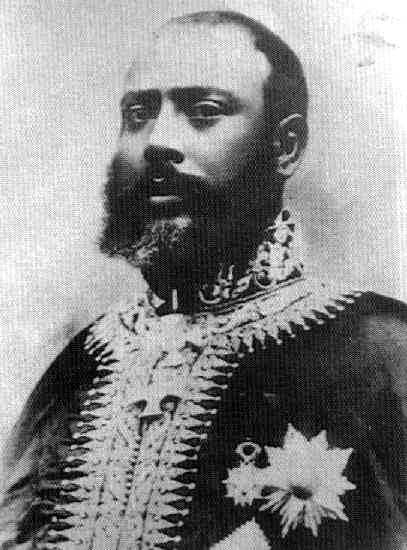 Dejazmatch Gebre Selassie Baria-Gabr, Prominent Tigrean NoblemanEmperor Menelik II was also to fall victim the political and professional intreagues of his medical staff. The story of the ups and downs of his medical care and their political significance coming soon.
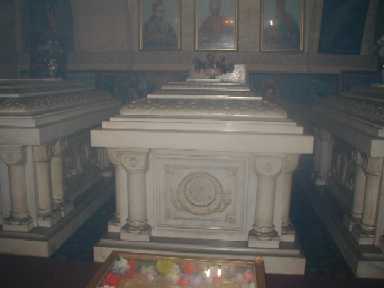 MORE OF PART 2 OF THE HISTORY OF EMPEROR MENELIK COMING SOON |

